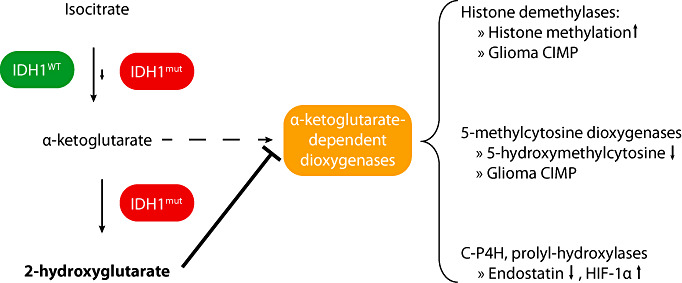Figure 3.

Impact of IDH1 mutation on epigenetic control. Isocitrate dehydrogenase 1 (IDH1) catalyzes the oxidative decarboxylation of isocitrate to α‐ketoglutarate (α‐KG), which is coupled to the reduction of NADP+ to NADPH + H+. IDH1 (eg, R132H mutation) results in a neomorphic IDH1 activity that catalyzes the NADPH consuming reduction of α‐KG to 2‐hydroxyglutarate (2‐HG). Thereby, α‐KG levels are reduced, and 2‐HG levels are strongly increased in IDH1 mutant tumor cells. 2‐HG is a competitive inhibitor of a large number of α‐KG dependent dioxygenases, including histone demethylases and 5‐methylcytosine hydroxylases of the TET protein family. Thereby, IDH1 mutation leads to altered methylation at different histone residues and decreased levels of 5‐hydroxymethylcytosine. Together, both epigenetic alterations are supposed to result in widespread changes in DNA methylation and the histone code, namely hypermethylation of multiple promoter‐associated CpG islands (G‐CIMP) and more compact chromatin. In addition, 2‐HG produced by mutant IDH1 also inhibits collagen‐prolyl‐4‐hydroxylase (C‐P4H) and prolyl‐hydroxylases, which may lead to tumor promotion by stabilization of HIF‐1α.
